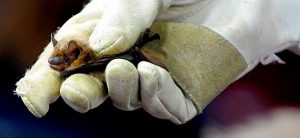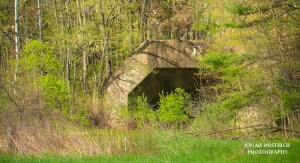 This little guy is a Big Brown bat, one of seven bat species found in Wisconsin. A mobile bat survey conducted in June 2010 at Badger Army Ammunition Plant found four of these bat species – two state Threatened and two Special Concern species. A winter hibernation site with 50 Big Brown bats was recently found at Badger within a man-made structure.
This little guy is a Big Brown bat, one of seven bat species found in Wisconsin. A mobile bat survey conducted in June 2010 at Badger Army Ammunition Plant found four of these bat species – two state Threatened and two Special Concern species. A winter hibernation site with 50 Big Brown bats was recently found at Badger within a man-made structure.
A single Big Brown bat can catch 600 mosquitoes in just one hour. By feeding on insects, bats are an important component of healthy ecosystems. The Driftless Area of Wisconsin, including the Baraboo Hills, is particularly rich in known and potential winter hibernation sites, and Badger is within easy commuting distance for summer resident bat populations. Badger also provides habitat along a critical migratory corridor for bats – the Lower Wisconsin Riverway.
Badger is of particular interest to bat conservationists as the military ammunition production and storage bunkers and similar facilities may provide a unique opportunity to help in the prevention and recovery of bat populations from White-Nose Syndrome, an emerging threat to Wisconsin’s bats. The subterranean nature of these structures makes them likely candidates for artificial hibernation sites due to the buffered temperatures and humid conditions they provide.
 Structures that could be suitable for use in these efforts include storage magazines, nitroglycerin production bunkers, cannon range tunnels, and subterranean infrastructure such as large-diameter water and sewer piping and water containment areas, according to bat experts with the Wisconsin Department of Natural Resources.
Structures that could be suitable for use in these efforts include storage magazines, nitroglycerin production bunkers, cannon range tunnels, and subterranean infrastructure such as large-diameter water and sewer piping and water containment areas, according to bat experts with the Wisconsin Department of Natural Resources.
June is an important time of year for bats. In early June, mother bats form maternity colonies and have one baby, called a pup. The pups are flightless for the first few weeks so please remember that bat proofing or exclusion is not allowed from June 1 to August 15 to protect the colony and baby bats.
Bats are among the many species that will benefit from our continued commitment to nature-based peaceful recreation at Badger. These lands are a wonderful opportunity to provide bats with the habitat they need for roosting, foraging, and drinking water – and gobbling up those mosquitoes!

